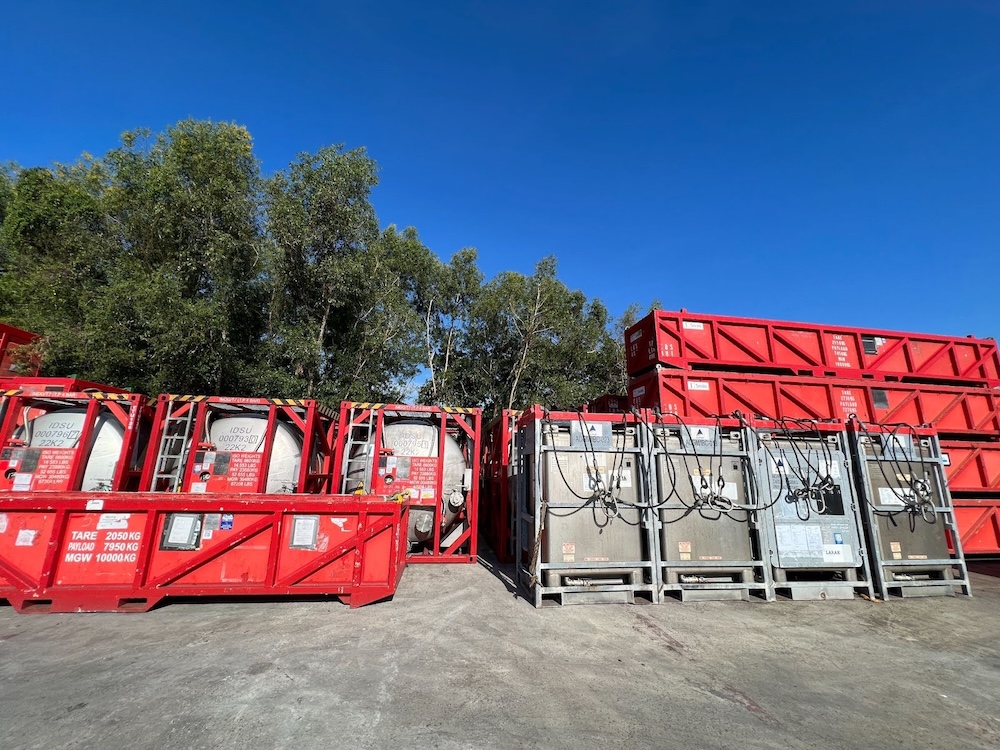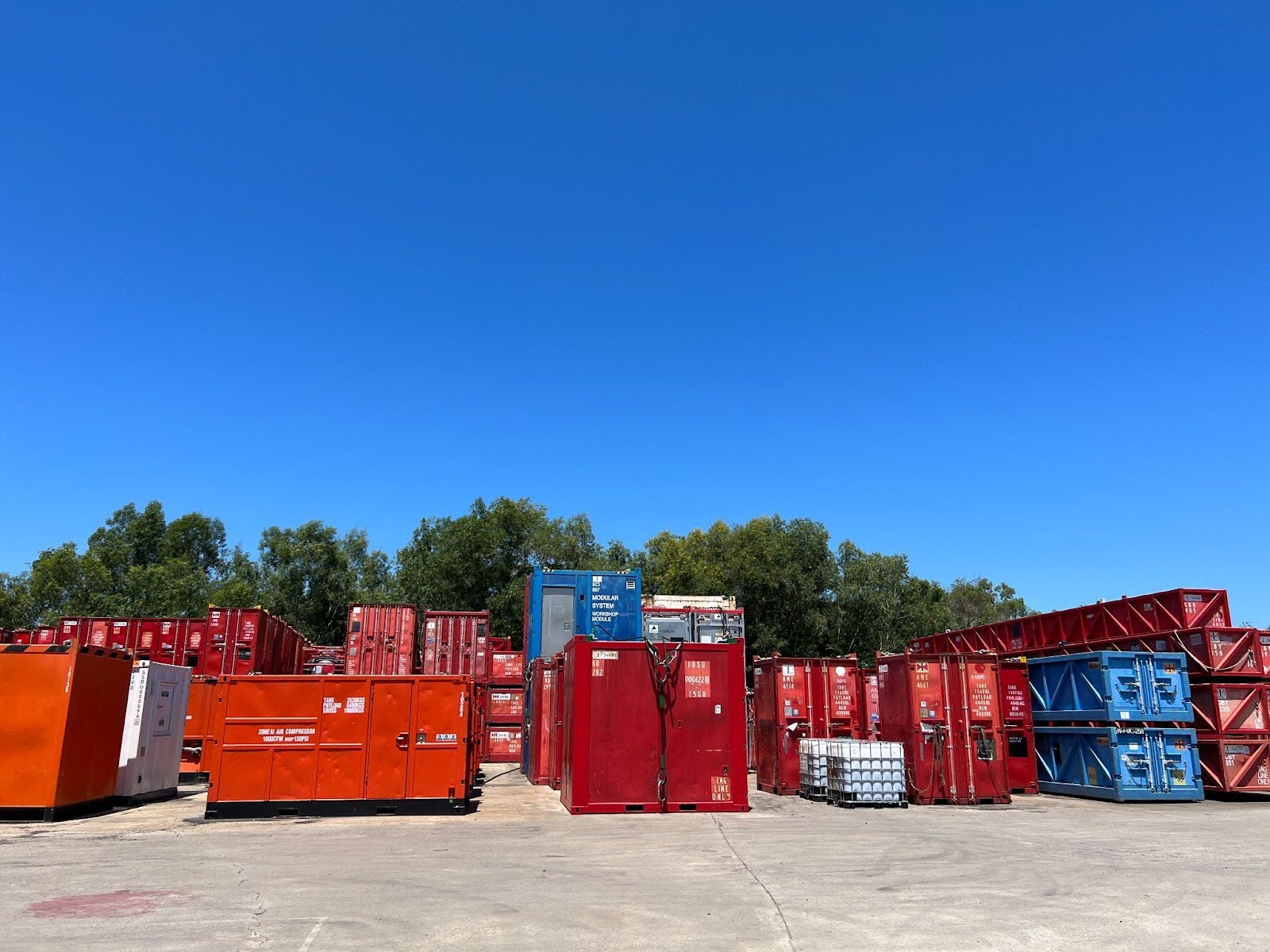Offshore Containers & Baskets in Malaysia: Ensuring Safe Cargo Handling
Published on July 1, 2025
Category: Blog
Offshore cargo handling plays a vital role in Malaysia’s oil and gas sector. For any oil and gas company in the region, selecting the right containers and baskets is critical to maintaining safety, operational efficiency, and regulatory compliance during cargo transfers to offshore rigs and platforms.
Certified equipment ensures smooth operations across Malaysia’s major logistics hubs. In Kemaman, for instance, deploying the right offshore container in Kemaman supports time-sensitive rig mobilisations.
Meanwhile, in Labuan and Sarawak, operations rely heavily on purpose-built units such as offshore baskets in Sarawak and containers customised for platform-specific needs.
What Are Offshore Containers and Baskets?
 Offshore containers and baskets are cargo carrying units (CCUs) designed specifically for marine environments. Their construction must adhere to strict certification standards to withstand high-impact lifting, rough sea conditions, and repeated handling. Common use cases include transporting:
Offshore containers and baskets are cargo carrying units (CCUs) designed specifically for marine environments. Their construction must adhere to strict certification standards to withstand high-impact lifting, rough sea conditions, and repeated handling. Common use cases include transporting:
- General equipment and maintenance tools
- Fluids and chemicals in sealed tanks
- Gas cylinders in racks with lash points
- Temperature-sensitive goods in refrigerated containers
- Waste and drill cuttings in heavy-duty skips and tubs
What Are Offshore Containers?
Offshore containers are specially designed cargo units built to safely transport goods in harsh marine environments, particularly for offshore oil and gas operations. These containers are constructed to withstand extreme lifting forces, rough sea conditions, and repeated handling during offshore transfers.
In Malaysia, offshore containers play a vital role in daily logistics—especially in hubs like Labuan, where platform supply operations depend on the reliable use of each offshore container in Labuan.
Common offshore container types include:
- Freight containers – Used for general equipment and supplies
- Tank containers – Designed for carrying liquids and chemicals
- Half-height containers – Suitable for heavy or dense cargo
- Reefer containers – Refrigerated units for temperature-sensitive items
Each type is engineered for specific offshore needs, helping ensure secure cargo handling throughout Malaysia’s offshore logistics network.
What Are Offshore Baskets?
Offshore baskets are heavy-duty, open-top or mesh-sided containers used to safely transport large, irregular, or elongated equipment to offshore platforms and rigs. They are specifically designed for fast crane handling and are commonly used in demanding oil and gas operations.
These baskets are ideal for carrying items such as drill pipes, scaffolding, tools, and other oversized components that don’t fit standard containers. Their durability and accessibility make them a vital part of daily offshore logistics.
Key features of offshore baskets include:
- Reinforced steel frames and certified lifting slings
- Open-top design for fast crane transfers
- Customisable dimensions to fit specific cargo requirements
Offshore baskets are widely used on support vessels and rigs across Malaysia. For example, an offshore basket in Labuan is frequently deployed for rig servicing and equipment transport, while in Sarawak, exploration campaigns rely on rugged baskets for efficient, rapid mobilisations.
Industry Safety Pillars for Offshore Containers and Baskets:
1. DNV 2.7-1 Certified Equipment
This globally recognised certification from Det Norske Veritas is the foundational standard for offshore cargo carrying units (CCUs). It ensures that offshore containers and baskets are designed and tested to withstand heavy lifting, rough seas, and high-impact conditions common in offshore environments.
2. Compliance with ISO 10855 Standards
ISO 10855 further strengthens safety by outlining technical specifications for design, structural integrity, and operational testing of offshore containers; ensuring consistent performance across projects and platforms.
3. Versatile Equipment Built for Offshore Demands
Offshore containers come in various formats: enclosed units for sensitive tools, tanks for liquid storage, gas racks, insulated containers for perishables, and skips for handling waste. Each is engineered for purpose-specific durability and safety.
4. Advanced Testing Protocols
Before being deployed, offshore containers must pass multiple tests such as vertical drop, lifting stress, and load simulation. This is to verify that they can endure offshore handling stresses without failure.
5. Scheduled Reinspection and Certification
Containers in use are subject to ongoing inspection schedules and recertification protocols to ensure continuous safety compliance, especially when reused across multiple offshore cycles.
6. Customised Builds for Project-Specific Needs
Offshore operations often require containers built to precise specifications, especially for non-standard equipment or space-limited platforms. Customised offshore containers can be designed to meet exact dimensional, structural, and safety requirements, ensuring compatibility with diverse operational demands.
7. Trusted Local Capabilities in Offshore Logistics
Malaysia’s offshore logistics sector benefits from a strong network of certified equipment providers. These local suppliers support the industry by delivering offshore containers and baskets that align with international standards—helping operators meet safety regulations and streamline offshore operations efficiently.
Why Safety Matters in Offshore Logistics
The stakes are high when operating offshore. Equipment failure, poor cargo handling, or uncertified units can lead to costly downtime, damaged goods, or workplace accidents. Certified offshore containers help reduce these risks by ensuring:
- Safe hoisting and transport
- Asset protection under extreme conditions
- Regulatory compliance across global standards
- Operational continuity with reduced downtime
Industry Note: Poor cargo handling contributes significantly to non-productive time (NPT) and safety incidents in offshore energy sectors worldwide.
Types of Offshore Containers Commonly Used in Malaysia
| Container Type |
Description |
Use Case |
| Cargo Baskets |
Open-topped, mesh-sided units |
Loose tools, pipes, scaffold parts |
| Freight Containers |
Fully enclosed, secure steel containers |
Electricals, hardware, supplies |
| Half-Height Containers |
Shorter units for heavy items |
Hose reels, large parts |
| Tank Containers |
Cylindrical tanks with valve fittings |
Liquids, chemicals, water |
| Skips & Tubs |
Waste bins with open tops |
Mud, sludge, discarded material |
| Gas Racks |
Stackable gas cylinder carriers |
Offshore welding, gas storage |
| Modular Units |
Workspaces, storage, or filtration bays |
Offshore maintenance, blending ops |
These container types are commonly used by operators across key offshore regions such as Kemaman, Labuan, and Sarawak; often tailored for specific applications like drilling support and well servicing.
Altus Oil & Gas Malaysia: Setting the Standard for Safe Offshore Logistics
 Altus Oil & Gas Malaysia supports offshore operations with a full portfolio of certified CCUs and integrated logistics services. In partnership with SWIRE Energy Services, they offer one of the world’s largest fleets of offshore containers, backed by DNV 2.7-1.
From supplying offshore containers in Kemaman to managing rapid deployments of offshore baskets in Labuan and Sarawak, Altus ensures that safety, readiness, and compliance are maintained across every operation.
Altus Oil & Gas Malaysia supports offshore operations with a full portfolio of certified CCUs and integrated logistics services. In partnership with SWIRE Energy Services, they offer one of the world’s largest fleets of offshore containers, backed by DNV 2.7-1.
From supplying offshore containers in Kemaman to managing rapid deployments of offshore baskets in Labuan and Sarawak, Altus ensures that safety, readiness, and compliance are maintained across every operation.
Field-Ready, Certified, and Trackable
Every container is:
- Fully tested and certified
- Fitted with traceable slings and lifting gear
- Optionally equipped with Asset Tracking Systems for live logistics visibility
Altus’s solutions are built for reliability during urgent mobilisations and multi-phase offshore projects, offering rapid dispatch from strategic hubs in Labuan, Kemaman, Pasir Gudang, and Bintulu.
Safe Cargo Handling Backed by Experience
In Malaysia’s energy industry, operational integrity begins with logistics. Offshore containers may seem like simple assets, but in the hands of a reliable provider, they become critical tools for success. Altus Oil & Gas Malaysia understands this better than most.
Through their certified equipment, regional readiness, and unwavering commitment to safety, Altus continues to shape how offshore cargo is always handled confidently and with precision.
Contact Altus today to learn more or connect with a logistics advisor for tailored support.
Continue Reading: Deepen Your Offshore Strategy with Altus
Unlock more knowledge from Altus Oil & Gas Malaysia as you navigate the complexities of offshore operations. These selected reads offer practical perspectives on improving performance, safety, and logistics in Malaysia’s oil and gas sector:
Whether you're planning your next mobilisation or refining your logistics strategy, these insights will help guide confident and compliant offshore decision-making.
 Offshore containers and baskets are cargo carrying units (CCUs) designed specifically for marine environments. Their construction must adhere to strict certification standards to withstand high-impact lifting, rough sea conditions, and repeated handling. Common use cases include transporting:
Offshore containers and baskets are cargo carrying units (CCUs) designed specifically for marine environments. Their construction must adhere to strict certification standards to withstand high-impact lifting, rough sea conditions, and repeated handling. Common use cases include transporting:
 Altus Oil & Gas Malaysia supports offshore operations with a full portfolio of certified CCUs and integrated logistics services. In partnership with SWIRE Energy Services, they offer one of the world’s largest fleets of offshore containers, backed by DNV 2.7-1.
From supplying offshore containers in Kemaman to managing rapid deployments of offshore baskets in Labuan and Sarawak, Altus ensures that safety, readiness, and compliance are maintained across every operation.
Altus Oil & Gas Malaysia supports offshore operations with a full portfolio of certified CCUs and integrated logistics services. In partnership with SWIRE Energy Services, they offer one of the world’s largest fleets of offshore containers, backed by DNV 2.7-1.
From supplying offshore containers in Kemaman to managing rapid deployments of offshore baskets in Labuan and Sarawak, Altus ensures that safety, readiness, and compliance are maintained across every operation.
